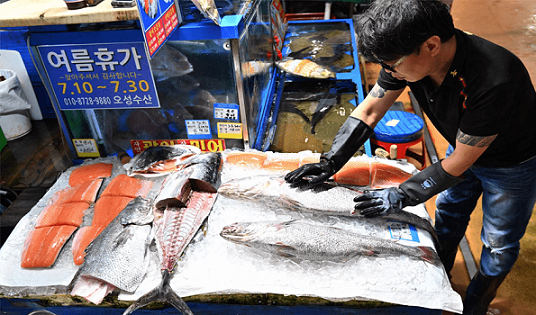In the bustling streets of Hong Kong’s Central district, the allure of high-end Japanese sushi restaurants remains undiminished, despite brewing controversy over Japanese seafood.
With diners paying up to $150 for a tasting menu, it appears that most patrons are undeterred by recent events unfolding in the seas.
The root of this escalating international dispute lies in Japan’s decision to release over 1 million metric tons of treated radioactive wastewater from the Fukushima nuclear plant into the ocean.
This move has ignited a fierce reaction from China, the world’s second-largest economy, which swiftly responded by banning all seafood imports from Japan, a significant extension of previous restrictions imposed on Fukushima seafood imports following the 2011 nuclear disaster.
Hong Kong joins boycott
In the bustling streets of Hong Kong’s Central district, the allure of upscale Japanese sushi restaurants remains unshaken, despite the brewing controversy surrounding Japanese seafood.
With customers willingly parting with up to $150 for a multi-course tasting menu, it seems that the majority of patrons are undeterred by recent environmental concerns stemming from the oceans.
The ongoing international disagreement stems from Japan’s controversial decision to discharge more than a million metric tons of treated radioactive wastewater from the Fukushima nuclear plant into the ocean.
This action has triggered a swift and strong reaction from China, the world’s second-largest economy, which promptly responded by enforcing a ban on all seafood imports from Japan. This move is an extension of previous restrictions that were initially imposed on seafood imports from the Fukushima region following the 2011 nuclear disaster.
Adding to this, Hong Kong, a semi-autonomous Chinese city, independently enforced its own ban on the import of aquatic products from ten different Japanese regions, including major areas like Tokyo and Fukushima. While diners in Hong Kong seem relatively unfazed, mainland China has exhibited a notably different response.
Chinese media, encompassing both traditional outlets and social platforms, have been flooded with outrage over Japan’s actions. A trending Weibo hashtag denouncing the wastewater release accumulated an astonishing 800 million views within mere hours of its announcement. China’s stance revolves around the notion that the ban is necessary to prevent any potential risk of radioactive contamination in food. China has also taken the opportunity to accuse Japan of acting in a “selfish and irresponsible” manner.
China the largest buyer
The intensity of this reaction is rooted in the deep-seated historical animosity between China and Japan, fueled by past conflicts and ongoing maritime territorial disputes. Instances of calls for boycotts against Japanese products are not uncommon, often rearing their head when historical grievances resurface or territorial conflicts escalate.
The situation is particularly worrisome for Japan due to China being its largest buyer of seafood exports. Despite Japan’s assurances of proper treatment, concerns about the safety of the released water have reverberated through the international community. China, in particular, maintains that this discharge poses a substantial threat to marine life and human health. Chinese officials have kept the door open for additional measures and have firmly cautioned Japan to take responsibility for its actions.
Although China isn’t the sole recipient of Japanese seafood exports, its significance as a market cannot be overlooked. Japanese officials are wary that China might broaden the restrictions on seafood imports, possibly enacting a comprehensive ban. Such a move could wield considerable economic ramifications for Japan, given that seafood exports constitute a significant proportion of its trade with China.
Following to the unfolding dispute, the tension between these two Asian giants continues to escalate. This not only raises concerns about trade relations but also casts a shadow over the delicate geopolitical equilibrium in the region. Japan is actively seeking scientific dialogues with China to address the concerns, yet the situation remains volatile, especially with the scheduled commencement of treated radioactive water release in the upcoming weeks, expected to span several decades.


